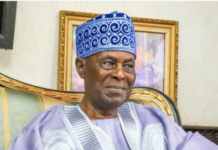
All Progressives Congress (APC) stalwart Asiwaju Bola Tinubu will be 68 on Sunday. But, the yearly colloquium to mark the ceremony has been cancelled due to the coronavirus pandemic. Deputy Editor EMMANUEL OLADESU examines the struggles, battles and exploits of the statesman, who has remained relevant in national life, 13 years after vacating office as governor of Lagos State.
Many politicians want to be like him. Some envy his influence. Others have turned themselves into detractors. But, the road to stardom is not paved with roses. How many of them can afford to go through the same furnace?
Asiwaju Bola Ahmed Tinubu, Third Republic senator, former Lagos State governor and All Progressives Congress (APC) stalwart, is a man of great struggles and exploits, who has trekked the thorny path to prominence.
His courage, sagacity, foresight, resilience, tolerance, forebearance, focus, and risk taking are legendary. The strength of the eminent politician fondly called the ‘Lion of Bourdilion’ lies in his power of progressive ideas, capacity for talent hunt, ability to nurture leaders and build institutions, belief in popular rule and commitment to public welfare.
When the history of the first two decades of the Fourth Republic is written, much space will be given to the master thinker and strategist, whose mobilisation prowess and organisational ability heralded the miracle of political change in 2015, continuity and consolidation in 2019.
Without dispute, Tinubu is still critical to future political permutations. He may have become the main issue in Nigeria’s politics as many expect him to play greater roles. The question therefore, is whether you are with him or not.
Thirteen years after leaving the Alausa Round House, the former seat of Lagos State Government, as a model governor, the Jagaban Borgu has remained relevant in national life. As he celebrates his 68th birthday on Sunday, the astute statesman will again be on the front burner.
However, Tinubu and his associates will not roll out drums. Although the annual colloquium in his honour has become a powerful tool of political mobilisation and offered the country a veritable opportunity to always reflect and make realistic projections for the future, this year is a departure.
There will be no lecture or debate in honour of the time-tested and trusted leader, pro-democracy crusader, seasoned administrator, and progressive arrowhead.The 12th edition is put on hold due to the Coronavirus pandemic.
Tinubu will be thinking about Nigeria during his birthday. This is a time for sober reflection. He will be neck-deep in brainstorming and problem solving. Politically, his hands are full. He is the silent reconciliator in APC at the state, zonal and federal levels. His efforts have not allowed the party to scatter, particularly during the recent Oshiomhole/Gaidom crisis when his wise counsel prevailed.
During the week, he and other members of the Lagos State APC Governor’s Advisory Committee (GAC) also halted the needles crisis that hit the House of Assembly. His advice on Amotekun also contributed to the truce between the Attorney-General and Southwest governors.
More fatherly roles await him in Ondo and Edo states as the crisis-ridden chapters thirst for reconciliation and peace ahead of governorship polls.
In post-Bola Ige era, Tinubu has remained the most outstanding Yoruba political megastar with a large following. It is because he has been building people to bid for power. Across the six regions, he is perceived as a bridge builder, rallying point and national asset.
‘Tinubuism’ encapsulates the time-tested philosophy of service premised on the evergreen Awoist theme of “Freedom for All, Life More Abundant.’ It is driven by the permanent and non-negotiable devotion to the creed of progressive welfarism in a polity still struggling to resolve the multiple crises of nation-building.
If the age-long proposals are re-adopted, they, like in the days of Awo in the old Western Region, will proffer solutions to conflicts of political participation, illusion of hope for gainful employment, contradictions in education, challenges of social welfare, and the quest for the restoration of sanctity of the ballot box.
Tinubu is a man of many parts, whose political profile has now dwarfed his rich resume as a professional accountant and financial surgeon, boardroom guru, strategic economic planner and socialite. Former House of Representatives member and Senior Presidential Assistant on the Diaspora Abike Dabiri-Erewa described him as a dynamic and visionary leader, seasoned administrator, courageous fighter, defender of the oppressed, foremost philanthropist, and man of the people.
The former governor is always bubbling with energy, zeal, enthusiasm and optimism. This may have been bedrock of his successes in his chosen fields of endeavor. There is no evidence to show that Tinubu was born with a silver spoon in his mouth.
But, he has confronted obstacles with uncanny boldness and bravery on the long, narrow and tortious path to limelight, and survived through the dint of hard work and divine grace. However, the stress, storm and strains of the past, which he had to pass through as a struggler, are hardly taken into consideration by detractors who are envious of his indomitable status.
The consummate politician understands, not only the language of politics, which, is a great deal of struggle, competition and antagonism, but also the logic of power, which in his consistent view, is not served a la carte.
Tinubu’s incisive wit, foresight and strategic thinking have always paid off during moments of grave challenges. He has always overcome the hurdles. Although the Federal Government waged war against him as governor, he survived. While the political earthquake swept across the Southwest in 2003, Tinubu became the last man standing.
If Tinubu had slept on guard in 2003, Nigeria would have become a one-party state under the Peoples Democratic Party (PDP). But, he resisted the intimidation by former President Olusegun Obasanjo and converted his weak position as an opposition figure to a position of strength.
From Lagos, the battle to reclaim the Southwest begun. Thecfoundation of APC’s dominance in the Southwest, and indeed, in the three northern zones, were laid by his tireless efforts.
Tinubu can also be counted among the consistent democrats and progressive leaders who have never jumped ship. Having placed his hand on the plough, he has not looked back. A great debater, he had honed his skills of negotiation, consultation, and reconciliation.
He is ready to bow to superior arguments. That is why he usually surround himself with egg heads from diverse fields. But, he is also endowed with persuasive talents.
As a leader of the progressive bloc, Tinubu’s greatest feat under the banner of the APC was the installation of a progressive government at the centre in 2015 and 2019. The defining moment was the 2015 presidential election. It is to his credit that the Southwest agreed to participate in mainstream politics for the first time. It never happened even in the days of indomitable Awo.
In the Third Republic, the celebrator was a man to watch. He had taken the politics of the populous Lagos West by storm. He won the highest votes as a senator in 1991 on the platform of the proscribed Social Democratic Party (SDP), defeating Mrs. Kemi Nelson of the banned National Republican Convention (NRC), who is now his close associate.
The bulk of the votes came from Alimoso sub-zone, which has since been referred to as the ‘Tinubu country.’
Tinubu shone like a star in the Upper Chamber. He was not a bench warmer. In fact, he stepped down for Dr. Iyorcha Ayu to become Senate President. But, his senatorial career was not insulated from vicissitudes. The all-civilian National Assembly had a military president, Gen. Ibrahim Babangida, to contend it.
When the transition programme finally failed as designed by the Evil Genius, Tinubu’s career as a federal legislator was aborted by the Abacha regime, which sacked the elected leadership.
He returned to the drawing board to politically strategise for the future. He joined the pro-democracy movement, the National Democratic Coalition (NADECO), to fight for democracy. By the time civil rule was restored, the symbol of the struggle, Chief Moshood Abiola, had died mysteriously in detention.
Tinubu was elected governor on the platform of the Alliance for Democracy (AD)in 1999. As governor, he presided over an administration that was a model between 1999 and 2007.
To observers, Tinubu became a key player in national politics, following his success at state and regional levels. For him, charity should begin at home. He had a 24-year development plan for the transformation of Lagos State. The Tinubu years in the Centre of Excellence were remarkable for progress.
As governor, he jerked up the internally generated revenue from the N600,000 monthly to billions of naira. Today, Lagos can boast of over N33 billion monthly IGR. The implication is that the state can survive without federal allocation.
Also, Tinubu fought the infrastructural battle in the city state. He constructed roads, built hospitals and schools, created opportunities for employment and re-energised the transport sector. He initiated the Bus Rapid Transit (BRT) project. The judiciary reforms he introduced were legendary. Tinubu pioneered the payment of NECO and WAEC fees for students.
The former governor also created additional 37 local councils, based on popular demand. When the allocations to the councils were seized by the Federal Government, his team of experts invented a creative financial engineering that made the councils to survive the federal onslaught.
As governor, Tinubu contributed to the debate on the national question as an apostle of true federalism and restructuring. He was also an electoral reforms curator. To him, the sanctity of the ballot box is critical to the survival of democracy.
Tinubu handed over to Babatunde Fashola (SAN) in 2007. After the expiration of his two terms of eight year I 2015, the lawyer-turned politician handed over to Akinwunmi Ambode, an accountant. On May 29, Ambode passed the baton to Babajide Sanwo-Olu.
Reflecting on his achievements, the Lagos State APC Governorship Advisory Council (GAC), observed that Tinubu succeeded in raising worthy successors. “What you celebrate today is the reality of unprecedented, steady and consistent progress in the Centre of Excellence, the foundation of which you laid as the first Fourth Republic Governor of Lagos State between 1999 and 2007.
Among the leaders that have been raised by Tinubu are Vice President Yemi Osinbajo (SAN), former Lagos State Attorney-General and Minister of Justice, Fasola, Ambode, Ekiti State Governor Kayode Fayemi, Minister of Information Alhaji Lai Mohammed, former Osun State Governor Rauf Aregbesola, one-time Finance Commissioner Wale Edun, Babatunde Fowler of Federal Inland Revenue Service, and Opeyemi Bamidele.
Tinubu and other compatriot floated the Action Congress (AC) in 2007. The Action Congress of Nigeria (ACN) reclaimed the Southwest, although the battle shifted from the ballot box to the court.
However, 2015 was the turning point. Tinubu’s gospel of strength in unity was the magic. Reflecting on the 2015 calculations, one of his associates said he re-invented the theory of the slaughter’s slab to suit the collective aspiration of the opposition.
In Tinubu’s view, there will be no going back for the defunct Congress for Progressive Change (CPC), led by Buhari, and Prince Tony Momoh, the All Nigeria Peoples Party (ANPP), led by Dr. Ogbonnaya Onu, the ACN, led by Chief Bisi Akande and a section of the All Progressives Grand Alliance (APGA), led by Imo State Governor Rochas Okorocha, if they agreed to merge together into a single party.
The merger, he explained, would lead to the permanent withdrawal of their certificates by the Independent National Electoral Commission (INEC). Tinubu, the acknowledged party financier, provided selfless leadership and the quantum of resources for the novel project.
He urged his colleagues to take the risk and be optimistic about the future. The struggle heralded President Buhari’s success at the poll and the abortion of PDP’s dream of ruling for the next 60 years.
Party faithful have also hailed his contribution to the President Buhari’s second term success. As the Chief ‘Reconcliator’ and Co-chairman of the APC Presidential Campaign Council, APC won a resounding victory. Also, the party under his leadership retained Lagos State for APC and produced Governor-elect Sanwo-Olu, who defeated Jimi Agbade of the PDP at the poll.
In politics and private life, Tinubu is reputed for philanthropy. His abode is a Mecca of sorts. He is a cheerful giver, benefactor, godfather and defender of the oppressed.
Tinubu holds honorary titles from many towns across the country. He is the Jabagan of Borgu Kingdom, Aare of Ile-Oluji and Aare Ago of Egbaland.
But, there are many aspects of his life that may not be known, until he opens up in his autobiography. When the autobiography is written, it will inspire the future generations.
Many stakeholders believe that Tinubu still has a lot to contribute to national greatness. Eyes are on him.
Paying tribute to Tinubu, House of Representatives member-elect and former Lagos State Works Commissioner Ganiyu Johnson said he is a talent hunter. “Your greatest strength lies in your ability to raise a crop of leaders who are building on the progressive foundation laid by patriotic pathfinders of history,” he added.
An APC youth, Toyin Balogun, described Tinubu as a source of inspiration to the younger generation. He said: “Your pedigree, sagacity, tenacity of purpose, hard work, resilience, courage and loyalty to worthy progressive causes have continued to serve as sources of inspiration to the younger generation in the vineyard of people-oriented, welfarist politics.”
Lagos State Local Government and Chieftaincy Affairs Commissioner Dr Wale Ahmed, who described Tinubu as an oak tree offering protective shield to progressives nationwide, said he has no equal in mentoring and role modelling. Ahmed, a former legislator and Special Duties Commissioner added: “God has equally blessed you with a good wife, Distinguished Senator Oluremi Tinubu (OON), who share your vision of greater good for the greatest number of our people.”
To House of Representatives member James Faleke said Tinubu’s name will continue to resonate in he hearts of lovers of democracy, urging other politicians to emulate his virtues. Hailing the celebrator, Lagos State House of Assembly Speaker Mudashiru Obasa said: “Your consistent struggle, selfless and constant sacrifices over the years have continued to define you as a true and worthy leader. You are indeed, an epitome of hard work, discipline, and patriotism. Without doubt, this generation is highly blessed to have your personality as a great mentor and trail blazer





